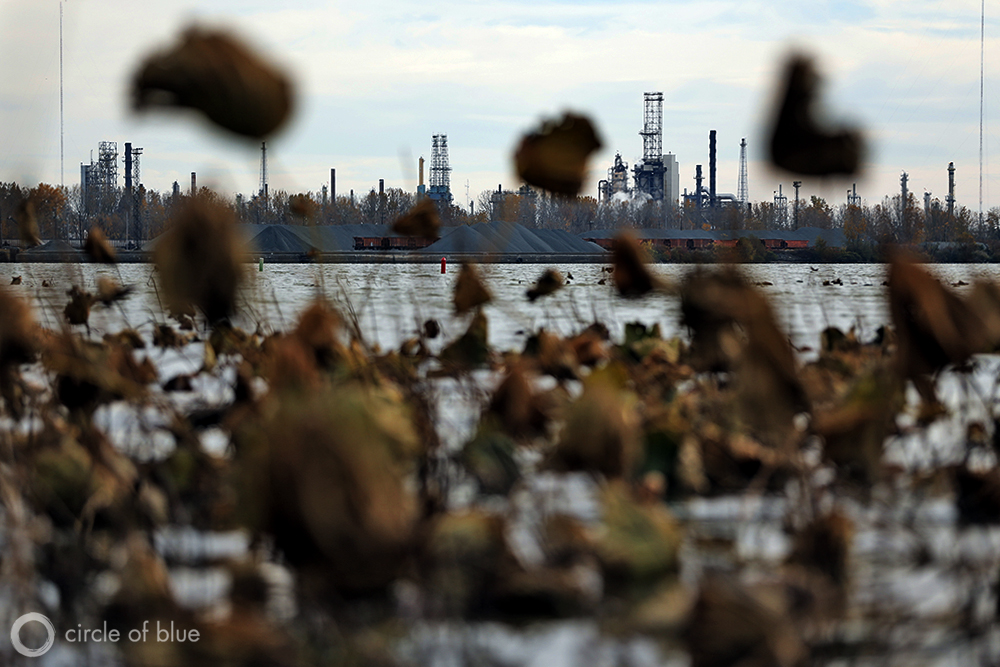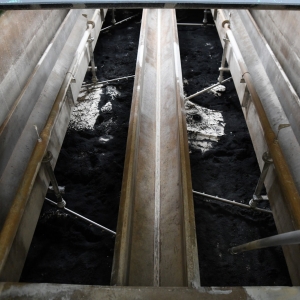The Stream, February 15, 2023: Concerns Over Water Pollution Mount in Wake of Ohio Train Derailment

The Maumee River, in northern Ohio / Photo by Scott Strazzante
YOUR GLOBAL RUNDOWN
- The derailment of a train carrying toxic chemicals earlier this month in eastern Ohio has put water utility and river-watch groups on high alert.
- In response to heavy rains and extensive flooding, the South African government has declared a national state of disaster.
- A new study finds high levels of toxic PFAS chemicals in icebergs floating near Norway in the Arctic Ocean.
- Fishing and farming communities in Nigeria’s Niger Delta have collectively sued the oil company Shell for contaminating drinking water and aquatic life.
New research shows how dams and development in Ethiopia have permanently altered floodplains, rivers, and Indigenous ways of life.
“Our life depends on fishing, hunting, bush fruit collecting, and flood cultivation. At this moment we have no bush to collect fruits from. The number of fish in the river is minimized, there is no animal to hunt.” — a Kwegu villager, quoted in the Oakland Institute report.
Mongabay reports that nearly a decade after the Gibe III Dam and sugarcane plantations were developed in Ethiopia’s Lower Omo Valley, starvation and disease is rampant among the region’s villages. The projects, introduced to bolster energy and crop production, displaced Indigenous communities and has prevented the Omo River’s annual flooding, on which locals entirely depend for food, according to the Oakland Institute.
Per the report, the floodplain’s disappearance, and the additional introduction of raw sewage into the Omo River, has created a hunger epidemic and myriad health outbreaks, including cholera. The Indigenous tribes, which include the Kwegu, Bodi, and Mursi, were promised jobs in exchange for their resettlement, though few have been available, all of which are low-paying (between $7 and $28 USD per month).
— Christian Thorsberg, Interim Stream Editor
Recent WaterNews from Circle of Blue
- New U.S. Climate Law Could Make Midwest Water Contamination Worse — Billions in clean energy incentives rely on raw materials from polluting corn and livestock.
- Flush with Cash, State Lawmakers Consider Water Risks — Water is poised for prominence this year in state law and policy.
The Lead
Concerns over drinking water, public utilities, and Ohio waterways are elevating after the derailment of a train carrying toxic chemicals is being linked to thousands of fish deaths in area streams.
News 5 Cleveland reports that about 3,500 fish across 7.5 miles of streams have died as a result of toxic chemical contamination near East Palestine, Ohio. The town was the site of a train derailment earlier this month, which saw 50 cars, including 10 carrying toxic chemicals, go off the rails. To dispose of the spilled chemicals, which included vinyl chloride and butyl acrylate, officials evacuated nearby residents and burned the substances, creating a large black plume and worries that the chemicals will persist in the air, soil, and surface waters, Newsweek reports.
East Palestine is located at the headwaters of the Ohio River, which flows southwesterly through Cincinnati and Louisville before connecting to the Mississippi River. Officials in both cities continue to test water quality, and have said that their drinking water remains unthreatened. WVXU reports that local officials have said that low levels of butyl acrylate did enter the Ohio River via tributaries, but the health risks it poses will be negligible. The EPA continues to monitor air and water quality in the area.
Still, other water utilities are taking precautions: West Virginia American Water is preparing a secondary intake installation, in case an alternative source of water is needed.
And the situation remains fluid — ABC News reports that the original train contained more chemicals than was originally reported, and some residents have filed suit with the Norfolk Southern train line, demanding they pay for and facilitate medical screenings. A town hall in East Palestine is scheduled for today, February 15.
This Week’s Top Water Stories, Told In Numbers
26
Different types of PFAS chemicals found in “alarming levels” in Arctic ice in Svalbard, Norway, where air temperature is warming faster than the world’s average. According to the study, the contaminated, melting ice is likely to move downstream, from high-altitude glaciers near the Arctic Circle to fjords and freshwater reserves in tundra ecosystems, the Guardian reports. The health risks that toxic PFAS poses for animals — from plankton and small fish to polar bears and seals — is significant, “doubling up” the effects of ice melt and climate change. PFAS, also known as forever chemicals, do not naturally break down. Per the study, TFA, a chemical used in refrigeration, was found in particularly high concentrations.
7
Number of provinces, of South Africa’s nine total, that have been affected by La Nina rains and flooding, over which a national state of disaster has been issued, Reuters reports. The heavy rains, especially impactful on the country’s eastern coast, compound a national energy crisis, the focus of another recently-issued state of disaster. Africa News reports that roads, bridges, and cars have been damaged or swept away, and farming and trade have suffered great losses. Five people have died, with many more seeking temporary shelter and relocation. The weather system has, in total, killed 400 people and affected more than 85,000.
On the Radar
More than 11,000 people in the Niger Delta have come together to sue Shell at the London High Court, Al Jazeera reports. The plaintiffs, from the Ogale community in southern Nigeria, are seeking compensation from the oil company, who they say have “destroyed farms, contaminated drinking water and harmed aquatic life,” with their oil spills and operations. Nigeria, one of the world’s top producers of oil, recorded 822 total spills in 2020 and 2021. The case adds to an existing lawsuit filed against Shell by another community, the Bille, from Nigeria’s River state. The average life expectancy in the oil region is 41 years, a decade less than the national average.
More Water News
Oil Refineries: New research from the Environmental Integrity Project reveals that southern Louisiana has eight of “the worst water-polluting refineries in the country,” NOLA.com reports.
Splash Mountain: Following the closure of the popular Walt Disney World ride, fans are selling bottles of its water, the New York Times reports.
Christian Thorsberg is an environmental writer from Chicago. He is passionate about climate and cultural phenomena that often appear slow or invisible, and he examines these themes in his journalism, poetry, and fiction.






Leave a Reply
Want to join the discussion?Feel free to contribute!